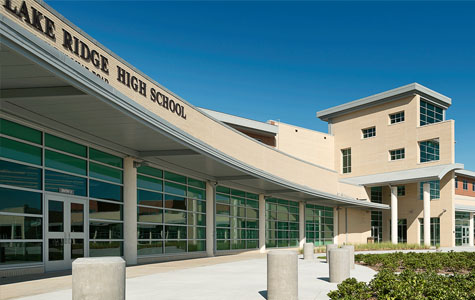
Neuroscientists have found that the teenage brain isn’t fully awake until about 9 a.m. This has led many people to question why high school students start school so early. MISD high schools starts at 7:25 a.m. and doesn’t let off until 2:55 p.m. At first glance, this might sound perfect. Starting so early ensures that students get off earlier and have more time to partake in other activities outside of school such as work. However, the early start time may be doing more bad than good.
It’s no secret that teenagers often do not get adequate amounts of sleep. In fact, the average teen only sleeps 7 ½ hours, when it has been proven they should be getting around 9 hours. Add homework, jobs, and sports to the equation and one gets a bunch of students not getting enough sleep and coming to school not fully rested, potentially affecting their performance in school when it comes to grades and extracurriculars. Senior, Emily Nguyen, believes that school should start at a later time.
“School starts early and it doesn’t give students enough time to function and get their brains warmed up. I mean half of us are awake before the crack of dawn and it’s still pitch black out. We should be in class at 8:30. I think it’s a good time. The sun is up, people have time to eat their breakfast and have their minds in the right place. It seems more ethical, in my opinion,” said Nguyen.
Teachers have also noticed differences between students they teach in the morning and afternoon. According to the National Center for Health Research, students who take morning classes are more likely to be more tired, resulting in a lack of participation and motivation. However, students in the afternoon may suffer the same symptoms after already having a long day at school. Spanish Teacher, Ivonne Want, notes how her morning and afternoon students behave differently.
“I do see the difference in my classes. My morning classes are always quieter, calmer, and half asleep. I’m having to wake them up all the time. My afternoon class, the last class of the day, is like ‘Oh My God, go to sleep,” explained Want.
The National Academy of Sciences reported that students who get less sleep, get worse grades. This could mean students in the morning may perform better than students in the afternoon. However, Want doesn’t think it’s that simple.
“I think that actually depends more on the students. There is a difference in behavior definitely. But as far as the performance goes, I have students in both first block and last block who do great. And then I have kids who don’t do so great. It really just depends on the kid,” stated Want.
Despite complaints from some students, not everyone feels the same when it comes to the start times of school. Some students are early birds and believe starting early gives them more time to fully take advantage of the day. Other students, like the ones who have late arrival, for instance, believe school starts way earlier than necessary. Senior, Ethan Le, falls somewhere in between.
“I think 7:25 is a good time. I don’t mind it because I wake up early in general, so I really don’t have an issue with waking up. I do believe that school starting later would give us more time to wake up, However, I’m pretty sure there are some laws to regulate so that’s probably why we start when we do. If the time was to change, I don’t think it would be anytime soon,” said Le.
The state of Texas requires students to go to school for 1,260 hours per year. From there, districts can distribute the hours how they see fit, meaning it’s ultimately up to the administration to determine what time school starts and ends. In order to get the times to change, an adequate amount of people would have to present it to the school board. It’s a long process that isn’t as easy as it sounds. The executive director of MISD high schools, Fernando Benavides, explains how changing the schedule for high schools, would result in the other grade levels undergoing significant changes.
“If we’re starting our high school kids later then that means our elementary kiddos are starting earlier, because you have to offset the times that you’re running these buses because as soon as our buses are done with the high school kids, they go and pick up the elementary kids, then the junior high, then the intermediate. So something always has to give. Who out of all our students that we have, Pre K through 12, are able to handle school starting so early and what impact would that have on learning for all levels?” stated Benavides.
Benavides was a teacher at Mansfield High School from 1989-2005, a principal in Arlington for about 11 years, and then came back to the MISD as a district administrator. Even then, school times have always been the same for years, Benavides details.
“High school start times have always been this early. We’ve always started early in this district, very much like our neighboring district in Arlington. That is my understanding. I’m not in charge of transportation. My role is to supervise and support high school principals, but that’s the way it’s always been and there has been no serious effort to change it,” explained Benavides.
Furthermore, Benavides also believes that there are other factors that make students dislike the early start times, as well as amounts of sleep.
“It has a lot to do with parents’ choices, parents’ wishes, and the students themselves. What are the expectations at home, to get a good night’s sleep? What kind of support do these kids have at home? Jobs, sports, extracurricular activities. Those are things that are beyond our control as a school district, but we should advocate for kids to get a good night’s sleep, 7-10 hours a night,” said Benavides.
Overall, it appears that MISD schools will not be starting later any time soon. It seems like the best solution for those who dislike the early timing of school is for them to get proper amounts of sleep and manage their time effectively.

